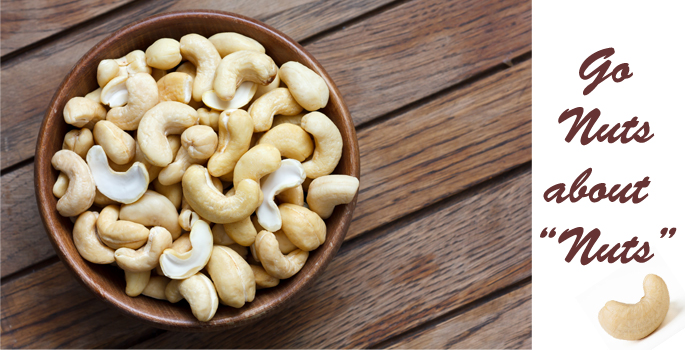
A new study has shown that cashew nuts can reduce systolic blood cholesterol in Asian Indians with type 2 diabetes.
According to a new study conducted by Dr. V. Mohan and his colleagues at Madras Diabetes Research Foundation (MDRF), Chennai, regular consumption of cashew nuts may actually be beneficial for health including people with type 2 diabetes. The report was published in the Journal of Nutrition.
A clinical trial showed that there was a significant decrease in the systolic blood pressure and a significant increase in the good cholesterol or the HDL cholesterol levels in this group. There was no deleterious effect of cashew nuts consumption on body weight, blood sugars, glycated hemoglobin or LDL cholesterol (bad cholesterol). “We had organized a 12-week intervention trial where we gave 30gm of raw cashew nuts daily to the experimenting group. The control group was advised to continue their usual diet. Both groups were well matched at baseline. The results were very encouraging.
“After 12 weeks, there was a significant decrease in the systolic blood pressure in the group that consumed cashew nut,” says Dr. Mohan.
Cashew nuts are generally not recommended by nutritionists and doctors in India. But what is not known is that cashew nuts contain healthy fats such as mono unsaturated fatty acids (MUFA). They are also a good source of anti-oxidants, plant sterols and other micro-nutrients such as iron, magnesium and zinc. Sudha Vasudevan, Head of Foods and Nutrition Research at MDRF says, “The beneficial effects seen may be due to the increased intake of MUFA from cashew nuts replacing the carbohydrate calories in the diet.
Indian diet is traditionally deficient in MUFA, a good type of fat, and cashew nut supplementation can help to improve the MUFA content.” Dr. Mohan further adds, “Although about 20% of the fat in cashew nut is of the saturated variety and it is predominantly stearic acid. This is relatively neutral on blood lipids suggesting that cashew nuts could have beneficial effects that are similar to those of other nuts.”
“This news should be music to ears of cashew nut lovers.” Says Dr. R. M. Anjana, Director Madras Diabetes Research Foundation and one of the key investigators of the study. She adds, “However, it must be pointed out that the study was done using raw cashew nuts. The beneficial effects of cashew may be mitigated, if the nuts are salted or roasted in unhealthy oils or ghee. Regular consumption of cashew nuts can also help in improving the satiety. This will lead to a reduction of food intake of the subsequent meal. These could be one of the mechanisms to explain the lack of weight gain in this study despite taking cashew nuts which are quite high in calorie.”
The research was conducted in the Cashew Export Promotion Council of India (CEPCI) and supported by the Ministry if Commerce & Industry, Government of India.
News Courtesy : Diabetic Living
